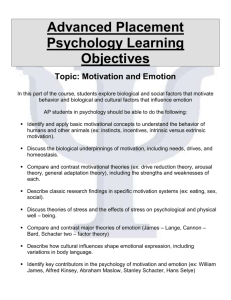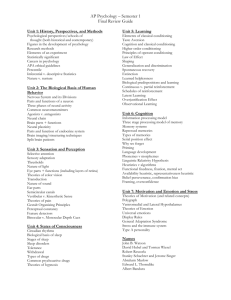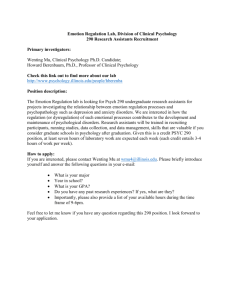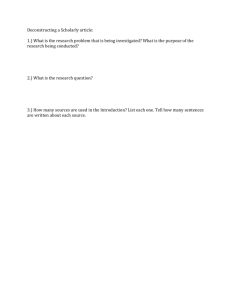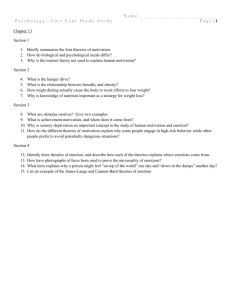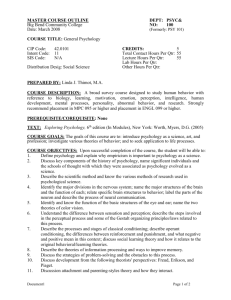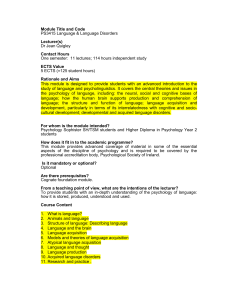Course Outline - Lake Land College
advertisement
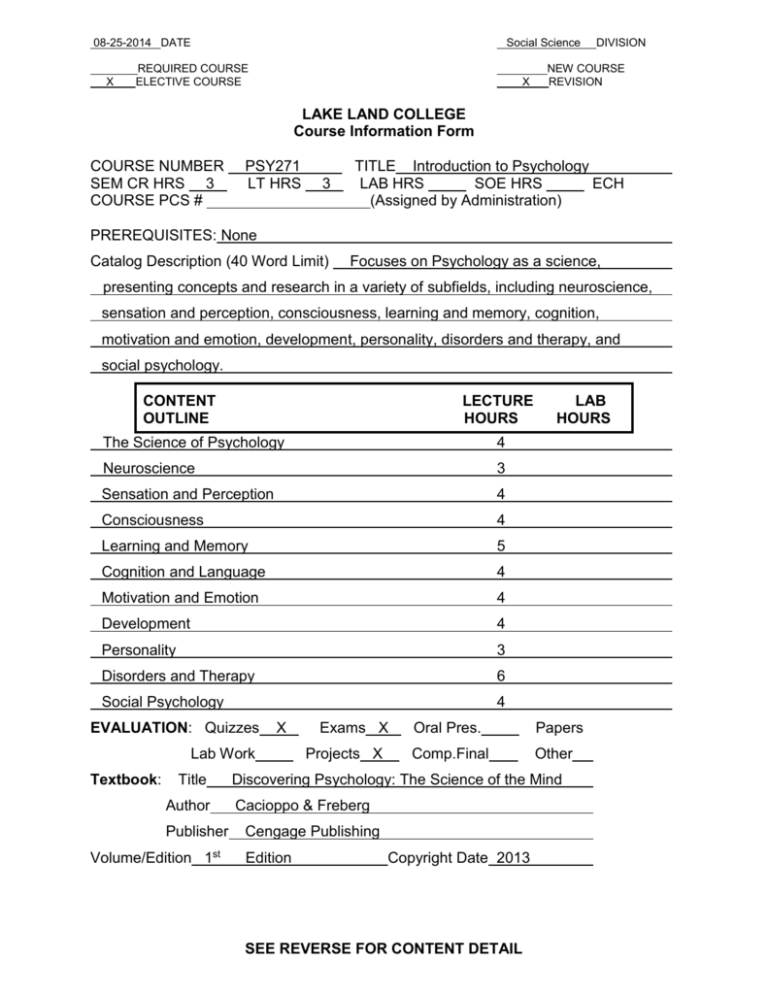
08-25-2014 DATE X Social Science REQUIRED COURSE ELECTIVE COURSE X DIVISION NEW COURSE REVISION LAKE LAND COLLEGE Course Information Form COURSE NUMBER SEM CR HRS 3 COURSE PCS # PSY271 LT HRS 3 TITLE Introduction to Psychology LAB HRS SOE HRS ECH (Assigned by Administration) PREREQUISITES: None Catalog Description (40 Word Limit) Focuses on Psychology as a science, presenting concepts and research in a variety of subfields, including neuroscience, sensation and perception, consciousness, learning and memory, cognition, motivation and emotion, development, personality, disorders and therapy, and social psychology. CONTENT OUTLINE LECTURE HOURS The Science of Psychology 4 Neuroscience 3 Sensation and Perception 4 Consciousness 4 Learning and Memory 5 Cognition and Language 4 Motivation and Emotion 4 Development 4 Personality 3 Disorders and Therapy 6 Social Psychology 4 EVALUATION: Quizzes X Lab Work Textbook: Title Author Publisher Volume/Edition 1st Exams X Projects X LAB HOURS Oral Pres. Papers Comp.Final Other Discovering Psychology: The Science of the Mind Cacioppo & Freberg Cengage Publishing Edition Copyright Date 2013 SEE REVERSE FOR CONTENT DETAIL I. The Science Throughout the course emphasis will be on Approaches and Subfields written demonstration of knowledge and application of concepts. Thinking Critically 1 a. Demonstration of critical thinking. b. Understand psychological approaches and subfields. Research Methods/Descriptive Research 3 Descriptive Research II. Neuroscience c. Compare/contrast research methods. d. Demonstrate knowledge of correlations. 3 a. Understand the importance of the mechanism of neurotransmission. Neural Systems and the Brain b. Knowledge of major neurotransmitters. c. Identify major nervous systems and brain parts. III. Sensation 2 a. Demonstrate basic understanding of sensory systems. Perception 2 b. Demonstrate basic knowledge of perception. Attention IV. Consciousness c. Discuss the importance of attention 3 Sleep disorders. Hypnosis b. Knowledge of effects/properties of psycho- Drugs V. Learning active drugs. 3 Classical Conditioning b. Demonstrate knowledge of operant Observational Learning Constructing Memories a. Demonstrate knowledge of classical conditioning. Operant Conditioning Memory Encoding/Storage/Retrieval a. Understand sleep stages, functions and conditioning. 2 c. Discuss features of observational learning. d. Demonstrate basic understanding of current thinking on memory. e. Discuss constructive memory research. VI. Cognition 2 Problem Solving and Decision Making a. Demonstrate knowledge of basic concepts in thought and language area. Language Intelligence-Definitions/Theories 2 b. Discuss different ideas about the nature of intelligence. Intelligence Testing VII. Motivation Theories c. Understand ideas of reliability and validity. 2 Hunger, Sex, Achievement Motivations Expressing and Experiencing Emotion theories and research. 2 Theories of Emotion VIII. Development Through the Lifespan a. Demonstrate knowledge of motivation b. Demonstrate knowledge of basic concepts and theories of emotion. 4 a. Demonstrate basic knowledge of Physical Development psychological changes that occur through Cognitive Development the lifespan. Social Development b. Understand theories of cognitive development. c. Demonstrate basic knowledge of temperament and attachment theory. d. Be able to discuss theories of moral development. IX. Personality-Psychodynamic Theory; 2 Trait Theory; Humanistic Theory; a. Demonstrate knowledge of theories of personality. Social-Cognitive Theory X. Psychological Disorders Therapies a. Discuss concept of abnormality. 3 Stress and Health Psychology XI. Social Psychology Social Thinking Social Influence. Social Relations b. Know basic categories and general symptoms of psychological disorders. 3 c. Know basic types of therapies used today. 4 a. Demonstrate knowledge of basic theories of social influence and attitudes. b. Know basics of research on conformity, obedience, and group influence. c. Be able to discuss current thinking on prejudice, aggression, attraction, and altruism. Course Outcomes: At the successful completion of this course, students will be able to: Define psychology as a contemporary science of behavior and mental processes. Identify the methods of study used by psychologists. Demonstrate knowledge of the complex interaction of nature and nurture that describes most human behavior and cognition. Demonstrate understanding of why the examination and evaluation of different sides of issues related to psychology are essential to reaching conclusions based on evidence, rather than blindly accepting arguments and conclusions.
